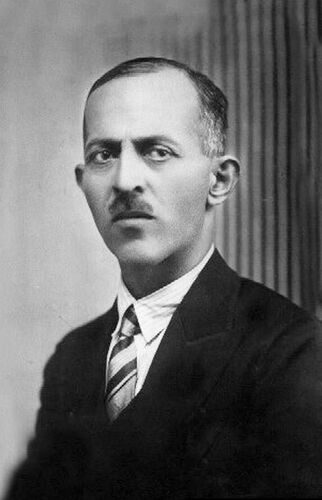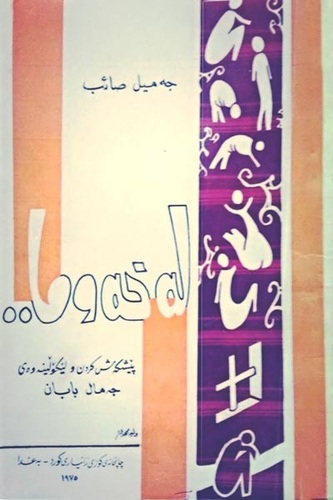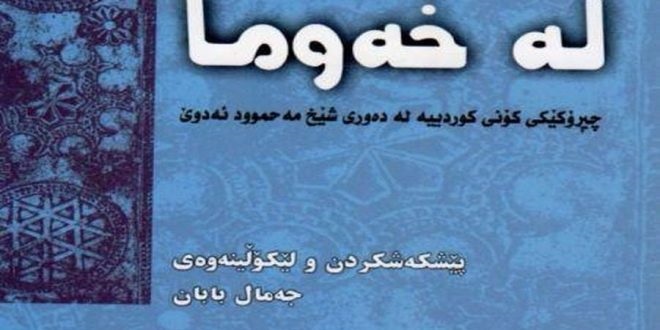It has been for years that when Kurdish narrative literature is being discussed, Jamil Saeb's novel of "In my dream" will be mentioned but the discussions about this work have never been more than regarding it as the first Kurdish novel without any more information about it. It seems that mentioning this work has been simply a word to be transferred from one to another and it is possible that most of those writers who have talked about this work might have never read it once. There are some reasons for such a claim. First, most of them have mentioned that the importance of this work is only for being the first Kurdish novel without possessing storytelling elements and it was written for a particular time period. Second, no one talks about the type of narration this work has or its setting.
Thus, this article is written to talk about In My Dream by Jamil Saeb to discuss some points about it.
In a short while, one hundred years will be passed over writing the first Kurdish novel i.e., "In my dream". This novelette was published for the first time in 1925 in the Zhianawa newspaper. At least, according to the texts published until now, this is the first narrative script in Kurdish. A year after this work, Ahmad Mokhtar's novelette titled " The Conscience Issue" was written which will be discussed later.
It is true that Jamil Saeb's work was a primary attempt for Kurdish narration but in comparison to the region's narration literature and as the first attempts in this literary genre, it was a strong and artistic start. In this story, the writer shows that he was aware of the world's literary works, and based on his awareness he had tried to create an artistic and special story much higher than a writer's memoir or biography.

He knew well how to create his story's setting. His characterization particularly the characterization of two characters in his story is very well-done and strong. The first character is the narrator of the story and the second one is the main character called Gawra (the great) who is beautifully created. The Gawra is the hero who is the center of every aspect of the narration as a hero and the one that determines the end of the story.
The Gawra's words and actions are narrated and he is described as a political leader. A leader who cannot decide at the end. He is confused and misled and he is introduced as a cruel character to the readers.
This leader plays his role among five groups. First, a group of people who are doing everything for their own benefit including plundering the people trying to get closer to the power circle and the Gawra holds meetings with them, consulting with them and he shows his agreement without rejecting them at all.
The second group is those who are either representatives of the Turks or meet Gawra to lobby for the Turks. They try to show the dependent leader that his land’s peace relies on the Turks' help. They share the same religion, history, and borders with Gawra's country and if they do not support him, his authority will deteriorate.
"Now the leader opened his mouth talking to people: I must know what you are saying and what you have. Among those three, the short man who came in first said that it is advised that we should come upon an agreement with the Turks and do as they wish. You should ask them to come and stay here. Then, this country will be completely yours and a government will be established, thus you will be able to combat your enemies with their support.
And he said: …. but I have never seen anything but words by them… they came along with a few needy soldiers who just could rub people and scare them and …"

The third group was some people lobbying for Britain. Based on the narrator's descriptions the third group is more familiar with the world's policies and political movements compared to the second group. Having them in your relationships circle will be more useful politically rather than the locals. Not only do they attempt to provoke Gawra by his religious beliefs and his country's borders issues, but also, they try to convince him that they know economic and industrial methods and that establishing a relationship with Britain can make him and the people assured that they will have a completely well-established government and if they act against this wish, Gawra and his nation will never gain their goals.
"After greetings, the first man who came in began to talk. He talked and talked and at the same time, his eyes were wide open. He talked so fiercely that I thought to myself he would faint or something. His hands were constantly moving on the sides. He wanted to impress the people completely without letting even a word be missed.
He looked at Gawra and said: Sir, right now the circumstances are in a condition that even a little kid knows that if England does not dominate and support this nation, they will not survive.
The wealth and good economic conditions that are popular among the people now in the past four or five years, would not have been gained 50 years after the Turks began their authority here…
He said: I like this and I think it is the best thing. You could hold a meeting among yourselves somewhere tomorrow and write down some laws and articles that will benefit both sides"…
The fourth group is those who contrary to the other last two groups, believe they should lay the local and global relationships aside and believe in their own strength. They think that an authority that is established not based on national ideologies and independence, is as worthless as a burned penny and it will never succeed.
"Some people came in. Some were wearing green Abas (long shirts worn by religious men) and white long hats, large Peches (a kind of hat that looks like a turban), the pom-pom like decorations of their hats hanging on them, their long hair on their shoulders dyed with Hana, some others had suits or Kurdish clothes with Pshtwen (a shawl like piece of cloth for Kurdish suits), … they had wrapped for or five rows of bullet chains around their chests. With their daggers and pistols fixed on their Pshtwen, they sat down and began to talk…
They said: what is our benefit, what are we good at, we have spent most of our lives, what do we need life for. We do not want this life anymore unless we do something. We will not be anybody else's puppet again. We only wish you well and nobody else is important to us. We swear to God that neither the Turks nor the English will let us live peacefully and freely… Gawra enjoyed these words"…









